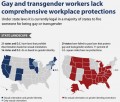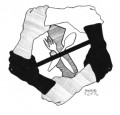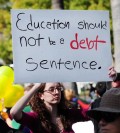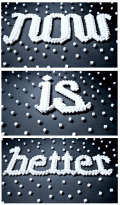News and Politics

Elisheva Biernoff, The Tools Are in Your Hands, proposal drawing, 2013. Courtesy of the artist and Eli Ridgway
A Wakeup Call: A Turning Point for Social Justice Judaism
“American Jews doing social justice work is nothing new. But the field of Jewish social justice is an emerging yet mighty one. Pew isn’t just an affirmation of social justice work. It’s a wakeup call that we can do better,” writes Abby Levine of the Jewish Social Justice Roundtable, reflecting on this week’s Network Assembly.
Torah, ENDA and Our Mandate to Act (Now)
The US Senate could vote this week on the Employment Non-Discrimination Act (ENDA). [See editor’s note for updates.]
May this bill pass in 2013, ending the 19-year struggle to ensure recourse against workplace discrimination based on sexual orientation and gender identity.
Why is passing this federal legislation so critical? Right now, transgender people can be fired in 33 states while lesbian, gay and bisexual people can be fired in 29, merely for being ourselves. Seeking fairness and justice state by state has been a tortuously slow process that leaves millions of people at risk for joblessness and its potential ramifications: poverty, homelessness, shame, depression, illness.
Why as Jews should we attend to this travesty? Regardless of our sexual orientation and gender identity, why should we make this struggle our own?
Why We Work With Our Local CAIR Chapter in Chicago
The question is not whether we can afford to work with CAIR, but whether we can afford not to.
Is the Wait Nearly Over for DC Waitstaff on Paid Sick Days?
“At the most basic level, it seems like the Jewish question is to ask whether an employer would be satisfied with their workplace policies if they knew those policies would also be applied to their parents, children, or siblings.” — Rabbi Elizabeth Richman, rabbi-in-residence, Jews United for Justice
Orange Is the New Black
We are in the Hebrew month of Elul, a time of review, return, and renewal leading to the High Holy Days. During Elul, we are asked to take stock of where and how we have fallen short, leading us to teshuvah, generally translated as “repentance” but really meaning “return.” Our “sins” serve as catalysts to return to our better selves, to God, and to Torah. This year, let us include among our shortcomings forgetting the humanity of those whom we have imprisoned and denying them the opportunity to do teshuvah.
Student Debt-- Education’s Path Spiraling: Time for a Jubilee?
They’re coming again. The plaintive calls. The desperate emails. The pleading Facebook posts. I started reporting on the student loan crisis as a journalist nine years ago, and almost immediately stepped over the line from objective observer to advocate and maven.
The Zimmerman Trial Juror Spoke Out — And Her Words Were Appalling
AuthorsJuror B37 said George Zimmerman must have had had “a good heart.” Zimmerman stopped a young heart from beating. What about that heart? For white Jewish women — and anyone outraged who doesn’t look like Trayvon Martin — this moment demands us to be effective allies, calling out racism and fighting it.
Trickle-down Sequester
The human fallout from sequestration is real and varied, writes Suzanne Reisman. For youth aging out of foster care, it takes a particularly vulnerable, small group of people who have already faced enormous challenges, and adds unnecessary barriers to their chances of success.
What Now? A July 4th Playbook for Protecting Voting Rights
This week, Americans nationwide will embrace the cliches and heat up their barbeques, catch some fireworks, debate national policies, hopefully capturing the spirit of July 4th and reflecting on their American blessings. Chief among those blessings — well, for citizens at least —is the right to choose the men and women who represent us. After all, this nation was founded by those who opposed “taxation without representation.”
Jewish tradition also speaks clearly to the importance of choosing wise and respected leaders. In the Talmud (Brachot 55a), Rabbi Yitzhak reminds us, “A ruler is not to be appointed until the community is consulted.”
So as American Jews, how can we respond to June 26th US Supreme Court decisionstriking down a key part of the Voting Rights Act?
Post-DOMA, Much MO(re) to be Done
The other night, I was reading my husband’s AEPi alumni magazine when I noticed a same-sex marriage announcement. I really didn’t think anything of it until much later that evening, when all of a sudden it hit me that this item had been included alongside all the other marriage announcements, no big deal. The fact that it wasn’t a big deal was, in fact, a big deal.
I wear many hats. I’m a social worker, a wife, a mom, a Clash fanatic and a Jew. I’m also a feminist and a progressive.
An Uproarious Week, with More to Come
It’s been an uproarious week for progressive Jews – with game-changing Supreme Court decisions (voting rights, marriage equality), a Texas-style filibuster to protect women’s reproductive rights (take that, SB5), and even a presidential climate change announcement. And it’s only Wednesday – with immigration reform on this week’s congressional calendar, too.
Blow by Blow: Beyond Religious Liberty vs. Civil Rights
The world’s changing fast, and it’s not making the Christian Right happy. With Loving Day around the corner, strategist Mik Moore takes Jay Michaelson’s recent report on “Redefining Religious Liberty” as his point of departure. And while laws expand (or retract) civil rights, Moore argues that we should pay as much attention to changing society norms. Especially when it comes to LGBT issues.
Feminists Take on Facebook
AuthorsFor years, Facebook has had an aggressive policy about hate speech, nudity and other kinds of content deemed offensive. One exception to this rule? Rampant rape humor, including threats, was treated as “free speech” by the social media behemoth. Until this week.
Five years after Postville: Standing Up for Immigration Reform
Five years ago one of the worst workplace raids in American history took place in Postville, Iowa — with 389 individuals detained, many deported and a town devastated. If ever there was an event that proved why comprehensive immigration reform and worker protections are needed, it was this raid.
However, for the two of us, the story in Postville started almost two years earlier, when we met with the owners of Agriprocessors, workers from the plant, and community and religious leaders.
Damage by Watching: Domestic Drones & Privacy
As domestic drones become increasingly common (cheap, too) and more states build them into public safety strategies for law enforcement, we need to think not just about public safety, but about protecting privacy and creating safeguards against abuse.
Chicago's Young Jews Align Against Public School Shutdowns
Authors“We are graduate students and organizers. We are Jewish folks and others who believe education is a Jewish value and a human right. Mayor Rahm Emanuel and the CPS school board have proposed massive school closings throughout Chicago’s most struggling neighborhoods.”
Zeek <3 Boston
As we mourn for Boston, we share this small roundup of early Jewish responses.
The Jewish Push for Immigration Reform: A Q & A with Abby Levine
The American conversation around immigration has taken its rightful place, center stage. Today, Abby Levine – 33 — is once again bringing Jews and social justice together to support comprehensive immigration reform, this time at the Jewish Social Justice Roundtable.
As a Landmark Civil Rights Trial Unfolds, A Passover Call to Action
AuthorsMarjorie Dove Kent Hopes to Pack the Courts before a Seder in the Streets This Week
“East Flatbush is calling for calm,” said Marjorie Dove Kent, executive director of Jews for Racial and Economic Justice (JFREJ), on Sunday. The killing of Kimani Gray coincides with Floyd v. City of New York, a federal class-action lawsuit filed by the Center for Constitutional Rights against the NYPD, challenging its practice of “suspicionless and race-based stops” against “hundreds of thousands if not millions of people.” Opening arguments for the trial were heard on Monday. This Wednesday, March 20th, Kent hopes the Jewish community will pack the courtroom in downtown Manhattan, then celebrate with Seder in the Streets, the latest installment of Jews for Racial and Economic Justice’s trademark boldness.
Letter from the (New) Editor
Zeek is back.
After a stint of recalibrating, we’re rolling out a new incarnation of Zeek, and I’m both proud and a bit giddy to be taking over as editor in chief.
My biggest hope for Zeek? That our readers (you!) will find an online magazine that’s unlike any other — one that showcases the people, ideas and conversations driving an inclusive and diverse Jewish community. One that’s smart, progressive, and Jewish. The kind of magazine that engages people. Inspires action and innovation. Isn’t the least bit shy about rabble-rousing or kickstarting debate.So here’s what to look for: an online magazine that’s unabashedly progressive, covers the vitality and voices of a growing movement, and profiles and promotes the ways Jews pursue justice in America. We’ll tell the kinds of stories that make clear and urgent the links between social justice and Judaism, while keeping a sense of humor.
![[the current issue of ZEEK]](../../../image/2/100/0/5/uploads/leftistethicistgraphic-52842c6a.png)
- 5000 Pages of Zeek
- Founded in 2001, Zeek was the first Jewish online magazine, and we have over 5000 pages online to prove it, all available free of charge. Read more in the Archive.



















